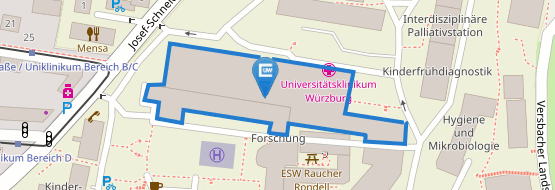Earlier detection of heart failure
03/01/2016In Würzburg medical doctors and scientists brought a possible strategy on the way to improve treatment of heart failure.
International experts got together in mid-February for a workshop at the Rudolf Virchow Center for Experimental Biomedicine. The aim was to strengthen the exchange of expertise in different disease fields. Autoantibodies (an endogenous substance) were at the heart of this discussion, as these appear more often in heart failure, similar to other autoimmune diseases.
The workshop was initiated by <link rvz forschung ehemalige-gruppen internal link in current>Prof. Martin Lohse (Institute of Pharmacology and Toxicology and Director of the Rudolf Virchow Center at the University of Würzburg) and Prof. Martin Ungerer (Chief Medical Officer of advanceCOR GmbH, Munich). The central question was whether cardiologists could apply diagnostic procedures and therapeutic tools of other dis-ease areas.
Among the participants were cardiologists, pharmacologists, chemists and medical doctors from European research institutions and university hospitals, as well as representatives of smaller biotech companies. They all share a common interest in autoantibodies, which are substances produced by the body to target antigens also produced by the body. Autoantibodies are a characteristic feature of autoimmune diseases in which the body does not direct its immune response against invading pathogens, but targets its owns cells and tissues. Well-known and widespread autoimmune diseases are, for example, diabetes mellitus type 1 and inflammatory rheumatoid arthritis.
Autoantibodies also occur in heart failure patients, a pathological condition, in which the heart is no longer able to pump sufficient quantities of blood into the body to supply all organs adequately. These patients usually have elevated levels of autoantibodies directed against the β1 Receptor of heart muscle cells. Such autoantibodies have stimulatory function and are suspected to contribute to the progression of heart failure and its symptoms such as fatigue, short breath and swollen legs.
A potentially useful therapeutic intervention in this condition might be to remove the harmful autoantibodies from the patient’s blood stream, thus interrupting continued stimulation of the β1 Receptor. However, such an approach depends on first being able to measure the relevant autoantibodies in an error-free and reproducible way – not only in the biomedical lab, but also under routine clinical conditions. This is where the concept of the workshop came in: what do we really know about the role of β1 Receptor autoantibodies in heart failure, what is the state-of-the art in terms of measuring these antibodies and what might a future standardized assay format as a precondition for successful therapeutic strategies look like?
In discussions it became clear that cardiologists could indeed learn from colleagues in other medical fields, e.g. from scientists and clinicians focusing on diabetes mellitus type 1, rheumatoid arthritis and autoimmune diseases involving the thyroid gland and autoantibodies targeting its TSF Receptor. In all these diseases, standardized assays to measure autoantibodies have already been established and provide the basis for therapeutic interventions.
Ungerer was pleased with the outcome of the workshop “The working atmosphere was very productive! My expectations were definitely fulfilled. This meeting may have been the starting point for similar events in the near future. Soon we hope to implement a universal assay in order to measure concentrations of β1 Receptors autoantibodies in heart failure patients”. The presence of representatives from biotech companies was a valuable addition to the meeting, in order to initiate future collaboration. “This interdisciplinary connection was very important to us. We will now send each samples to verify our approaches in practice. I am sure that this workshop leads to a new international research network, which supports better therapies for heart failure”, says Lohse.
At the end of the workshop, many participants remained in the room and continued to dis-cuss their ideas in small groups until late in the evening – a clear sign that concept of the organizers had worked out successfully.
Contact
Dr. Ole Riemann (Rudolf Virchow Center), ole.riemann@uni-wuerzburg.de
Dr. Daniela Diefenbacher (press office, Rudolf Virchow Center),Tel. 0931 3188631, daniela.diefenbacher@uni-wuerzburg.de



